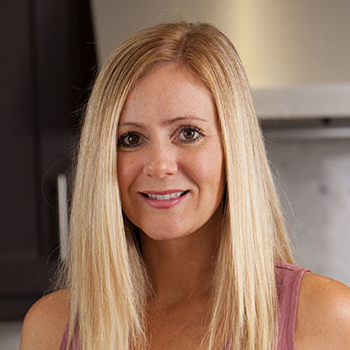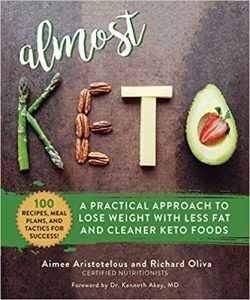
Today’s guest post is by Aimee Aristotelous, co-author of Almost Keto.
When I started writing a book on food and nutrition, I assumed potential publishing houses would perceive me as qualified enough to author a book. After all, I’m a nutritionist. But I received countless rejections. I realized I needed something more than just credentials or expertise.
As I perused the aisles of health, nutrition, and cookbooks in Barnes and Noble, trying to figure out who the published authors were, I saw that most were celebrities, MDs, or PhDs. So I decided I needed one of those highly regarded terminal degrees attached to my book. Finding and securing the right type of author partnership isn’t easy, though. Here’s what was instrumental in my process.
Choose the type of partnership that’s right for you
There are several ways to partner on a book.
Co-author. While you can have a co-author who will be responsible for writing a large portion of the book, this is basically like choosing a business partner, so choose wisely. My husband is my co-author on my second book and he is probably the only person I know who I would co-author with. Choose someone you know extremely well and have a formal contract that covers every possible aspect of the partnership. (Here’s a co-author contract template from the SFWA.)
Contributors. Alternatively, you can reach out to contributing writers who offer snippets of commentary and provide insight on areas where you don’t have much expertise. For example, in one chapter of my pregnancy nutrition book, I discuss nutritious introductory foods for a six month old, and one contributing writer, a pediatric nurse, gave added commentary about the mechanisms of the a newborn’s gastrointestinal tract.
In my second book on nutrition for health and weight loss, I discuss different types of fats and how Omega-3s are highly beneficial for heart and brain health. One contributing writer, a doctor of physical therapy, further elaborated on joint pain and inflammation, and how omega-3 intake can alleviate those symptoms.
In my case, all contributing writers signed contracts that gave me permission to use their work. The contract included a clause saying there was no guarantee that the contributor’s content would appear in the final book, although that was of course my intention. (You never know what will happen during the editing process.) I decided I would compensate contributors based on the number of copies sold. Other authors may pay contributors a flat fee upfront—and sometimes not at all. Every book and every deal is different.
Foreword or introduction by a well-known person. This was my preferred route for my first book and was used for my second book, in addition to a co-author. The foreword writer’s name and title is typically added to the cover of your book, which can be highly advantageous to both parties. But they will only be responsible for writing a short piece (usually no more than 1,500 words), while getting a publishing credit. Meanwhile, you get the clout of the foreword writer’s name on your project.
One word of caution: the foreword is the endorsement of your book by the foreword writer, so you should send them a full proposal or manuscript to help them determine if they’re comfortable with such an endorsement. And of course the foreword writer needs to review your book’s material to articulate and summarize why your book matters and is worth the reader’s time.
My foreword writer is a nutrition-focused MD who is extremely passionate about spreading true nutrition information that is not affected by lobbying or special interests. He wrote the forewords for both of my books at no cost. However, it’s common to pay someone an honorarium for the foreword, especially if that person is a known celebrity or influencer.
Look for aligning philosophies
With any partnership—whether it’s a business, a marriage, or a book—you should have aligning principles and philosophies. This doesn’t mean you have to agree on every last detail, but your overall theory about a particular subject should be pretty parallel. To avoid lots of time wasted, be 100 percent transparent about your concept and your ideas when you approach any potential partner or contributor.
That said, it doesn’t hurt to approach those who might agree with you on some points, but disagree on others. This can add wonderful contrast and depth to your book. My second book offers a moderate alternative to the Keto diet, which employs many animal-derived foods. One of my contributing writers is a staunch vegan, so how could this partnership possibly be symbiotic? Well, the plant-based nutrition lifestyle is gaining traction, so I provide a couple of chapters for those who want to explore a keto-like diet while remaining plant-based. Although my vegan contributing writing and I don’t necessarily agree when it comes to animal product consumption, she was able to stay true to her beliefs while adding valuable content that I do not specialize in.
How to find partners
There are three ways to go about this.
- Look to your own network. I started in my own backyard and made lists of friends and acquaintances who had the credentials I was looking for in a partner, and reached out with a summary of my book, asking them to be part of the project.
- Ask your network if they know anyone appropriate. One contributing writer I found is actually a friend of a friend. We got connected after I posted on Facebook that I was looking for contributing writers who specialize in the medical field.
- Reach out to strangers. I tried this using LinkedIn, and while I did find one wonderful contributing writer this way, it is more difficult to trust and connect with someone you have never met.
Have your proposal ready when approaching partners
You do not have to require that your partners write anything before you secure a publishing deal. Most people are not willing to put any writing work into a potential project, anyway. But agents and publishers do not want or expect a full manuscript if you are a nonfiction writer. Instead, you submit a book proposal (read Jane’s guide on book proposals).
Once you have a reasonably final proposal draft, you’ll share it with potential partners so they can review the material and decide if they’ll provisionally agree to being a part of the project, assuming you find a publisher. You can add their biographies to the proposal and describe what content they’ll contribute.
Parting advice
The book business is competitive, and traditional publishers invest in books they think will sell, so unless you are a celebrity or have an enormous social media presence, your singular expertise in your field may not be enough to nudge the publisher to believe in you and your concept. When you partner with one or more experts in the field, your book will have more credibility and potential reach, and thus more appeal to the publisher.

Aimee Aristotelous, co-author of Almost Keto, is a certified nutritionist, specializing in prenatal dietetics. She provides weekly fitness and nutrition tips to her 22,000 Facebook followers and has been the exclusive nutritionist for NBC affiliate KSEE 24 News in Fresno, California, appearing in over 50 nutrition and cooking segments. In addition to her Nutrition and Wellness certification through American Fitness Professionals and Associates, Aimee has a bachelor’s degree in business/marketing from California State University, Long Beach. She has nine years of professional marketing experience for a large, private California-based company. She resides with her husband and son in San Juan Capistrano, California.


Very helpful advice. Thanks for sharing your experience!
[…] Aimee Aristoelous has tips for using partnerships to help land a nonfiction book deal. […]